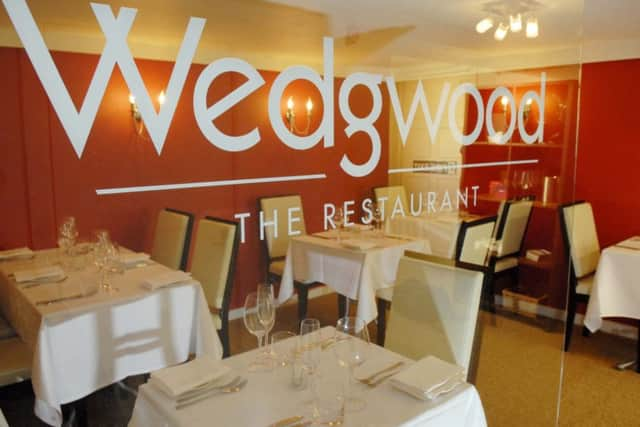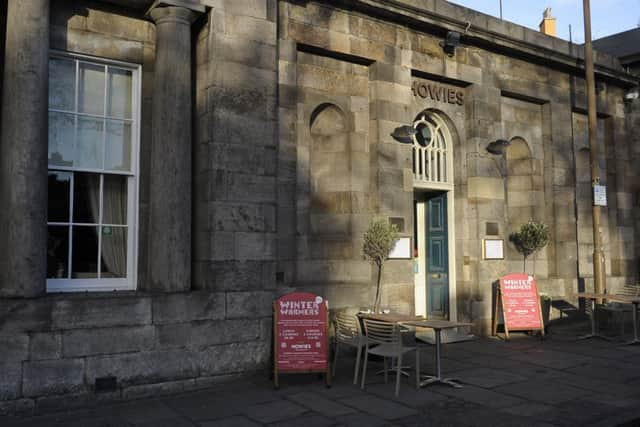One in four city eateries told to raise standards


The 26.5 per cent of 1259 establishments rated as “requiring improvement” by Food Standards Scotland was the most in the country, a new study reveals.
When pubs and takeaways are included, the figure rises to just over 28 per cent – the second highest across Scotland.
Advertisement
Hide AdAdvertisement
Hide AdOn the list requiring improvements is social enterprise Home, in Queensferry Street, which was inspected last November only a week before Hollywood A-lister Leonardo DiCaprio dined there.


Home’s owners blamed the rating on the fact the restaurant had only recently opened and had yet to be finished, with improvements now completed.
Other top eateries on the list requiring minor improvements were Howies, Waterloo Place, and the Royal Mile’s Wedgwood.
“We’d only been open for about three weeks and this was our first inspection,” owner of Home’s operators Maison Bleue, Dean Gassabi, told the Evening News. “We were given a list of things we should do to improve which we have done and someone was to visit us after 15 days for another inspection, which they haven’t.”
Advertisement
Hide AdAdvertisement
Hide AdMr Gassabi, whose restaurant has also hosted First Minister Nicola Sturgeon, added that contractors had yet to finish work on the kitchen when the inspection took place.


He said work to be done highlighted by the inspection included cladding, yet-to-be installed fridge doors and paperwork.
“I’ve been in the business for 25 years and have never failed a food hygiene inspection,” said Mr Gassabi, referencing an award for cleanliness from the Lord Provost.
Oscar winner DiCaprio had lunch at Home, profits from which support the homeless, while in the Capital to speak at the Scottish Business Awards.
Multi-award winning Wedgwood was inspected last month.


Advertisement
Hide AdAdvertisement
Hide Ad“The reason for our ‘require improvement’ status was a minor paperwork discrepancy since new legislations have been brought in regarding a raw food preparation area,” said co-owner Lisa Wedgwood. “We didn’t fail in anything hygiene or food related, merely paperwork.
“We were awaiting a re-inspection before Christmas even though the paperwork had been approved by e-mail by our EHO [environmental health] officer.
“Unfortunately they need to physically visit the premises to change this status, something they were unable to do prior to the end of December and we are now closed for our annual holiday until January 25.”
Howies in Waterloo Place was inspected in late November. Operations director Stephen Mackenzie said their required improvements related to game preparation.


Advertisement
Hide AdAdvertisement
Hide Ad“House rules determine how and when you prepare raw vegetables and raw meat,” said Mr Mackenzie.
“For each individual kitchen, every set of house rules is different – some kitchens are large, some are small. We needed to update our house rules in respect of game in November because we had game come in, including pheasant.”
Mr Mackenzie added that the required improvements were implemented within “eight hours” of the inspection and that food hygiene standards at Howies “couldn’t be higher”.
Of the 32 local authorities rated across Scotland, only the Highlands had a higher proportion of restaurants, cafes, pubs and takeaways requiring improvement than the Capital.
Advertisement
Hide AdAdvertisement
Hide AdFood voucher firm LoveMyVouchers.co.uk came up with the comparative study in a bid to inform diners.
“We conducted this study to raise awareness about food hygiene standards,” said Linda Firth, director at LoveMyVouchers.co.uk.
“When people only have a limited budget for eating out, they want to be sure they are spending their hard-earned money in restaurants and cafes that care about food safety.”
A total of 2,474 pubs, takeaways, restaurants and cafes were inspected in Edinburgh, with some inspections dating back five years.
Advertisement
Hide AdAdvertisement
Hide AdIt is unclear why so many establishments across the city required improvements, while details of inspections are not made public – only a “pass”, “required improvement” or “awaiting inspection” rating given.
Midlothian came fourth in the list of authorities with most required improvement ratings, with 24.3 per cent, with West Lothian and East Lothian fairing better at 23rd and 25th.
Once care homes, child minders and bed and breakfasts are included, 77 per cent of Edinburgh establishments achieve a “pass”, according to FSS data.
The rest are rated as “required improvement” or “awaiting inspection” – with a low number exempt as not serving sufficient food to require an inspection.
Advertisement
Hide AdAdvertisement
Hide Ad“The Food Hygiene Information Scheme (FHIS) open data is available on the Food Standards Agency’s website, the data is managed and uploaded by the individual local authorities in Scotland,” said an FSS spokesperson. “Consumers in Scotland can use the scheme to see how well food businesses have fared in their last food hygiene inspection.
“The voluntary scheme covers all food outlets which supply food to consumers from restaurants, pubs and takeaways, to bed and breakfasts and childminders. A ‘pass’ shows the business has broadly met the legal requirements in its food hygiene inspection, and that procedures and processes are in place for providing safe food.
“Where a business has failed to meet these requirements it will be issued with an ‘improvement required’ certificate.
“A small number of food businesses may be exempt, where it is unlikely that consumers will view them as food premises and assessment has concluded that the food safety risk is negligible.
Advertisement
Hide AdAdvertisement
Hide Ad“Other food businesses may be awaiting a food hygiene inspection from their local authority.”
A city council spokesperson said: “Our environmental health team inspect and assess food premises, providing written advice and guidance on what they must improve in order to achieve a pass, where necessary.
“The council is committed to ensuring public safety, so inspections are carried out rigorously, with regular follow-ups to certify standards are adhered to.
“Ultimately, it is the responsibility of the food business operator to comply with food hygiene legislation and enforcement action is taken when appropriate in accordance to the City of Edinburgh’s food hygiene enforcement policy.”
‘People should feel confident to eat out’
Advertisement
Hide AdAdvertisement
Hide AdSenior lecturer at the Edinburgh University vet school, Dr Alessandro Seguino, stressed the importance of food hygiene standards.
“Food hygiene is important because the whole point is to prevent bacterial contamination of food,” said Dr Seguino.
“Bacteria can come from handling of food or dirty aprons or dirty work surfaces. If cleaning is not done then bacteria can find the protein in meat and fat that it needs to grow.
“Bacteria is a bit like us, it needs a nice environment to survive and it needs protein from food and carbohydrates.”
Advertisement
Hide AdAdvertisement
Hide AdPrior to joining the university, Dr Seguino led a team of six vets inspecting abattoirs for the Scottish Government. His team were responsible for assessing animal health, welfare and contamination prevention.
“The whole point of food hygiene is to remove the presence of bacteria by cleaning in the kitchen and to prevent contamination by making sure hands are washed and food is kept away from any contamination or cross-contamination – like keeping chicken away from vegetables.”
Dr Seguino said there was an important distinction between spoilage bacteria in “best before” labelled food and the more serious pathogenic bacteria in “use by” labelled food.
“The pathogenic bacteria is the one we’re more worried about because it’s very likely it can cause disease in humans, such as salmonella, e-coli and listeria.”
Despite the warnings, Dr Seguino said d
Certificates should be displayed
Advertisement
Hide AdAdvertisement
Hide AdINSPECTIONS are carried out by council environmental health officers under national guidance from Food Standards Scotland.
City diners can check the restaurants, pubs, cafes and takeaways they visit meet standards by checking it has a Food Hygiene Information Scheme “Pass”.
The city council advises diners to ask the restaurant, look for the certificate or check the FSS website. Environmental health officers give the business a certificate and ask them to display it on their window or door.
These ratings are based on the conditions they found at the time of their inspection – though officers stress standards may have changed since.
Advertisement
Hide AdAdvertisement
Hide AdA small number of businesses may be exempt from the scheme as they are “very low risk”.
Although the council aims to provide the most up-to-date results, they warn it may have been a long time since some businesses were inspected.
“This is because we have had to focus on the higher risk businesses,” says a council spokesperson. “Everyone in the scheme will be inspected as soon as we can and the results will continue to be updated.”